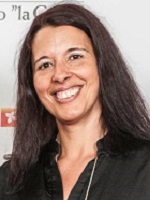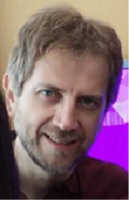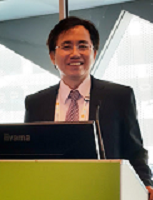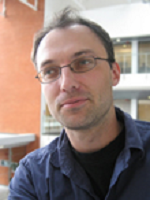Keynote speakers
Carina Dantas

CARITAS Coimbra, Portugal
No excuses – keep investing in wellbeing and inclusion
Abstract
We have always advocated that the end users of any digital tool have to be involved in the products development since their conception, so that the technologies developed will not later be out of scope with the real needs of those who will actually use them.
We are aware, however, that for many, in addition to the disease, the impact of the state of emergency and the containment measures due to Covid-19 has been truly devastating. And that this will be an even greater challenge for the near future. Long-term consequences are more serious than those existing at present times and have a broader perspective.
In recent years there was already a solid discourse and political will, transversal to most European countries, on the need to invest in prevention, in promoting accessibility and person-centred digital solutions. In short, consensus on the need to move forward and invest in wellbeing and quality of life.
However, the post-pandemic economic crisis and the social changes that are emerging from this period will easily create the opportunity to remove these priorities from the political agenda and funding plans and that, unless action is taken, can lead to a setback of more than 5 years in implementing innovation and quality of life for citizens.
During this pandemic period, many traditional services had to be closed; hospitals were crowded and people were afraid to go to the family doctor in person; loneliness and lack of family support due to travel restrictions have been exacerbated and digital services, if implemented and accessible correctly, can be a useful tool to address many of these challenges.
However, we have never been more aware of inequalities and their implications for universal access.
A huge ethical challenge to be faced will be to redefine the balance between digital tools and human presence. If this was already somewhat stable in public opinion, the emergency period polarized opinions once again.
It will take an enormous sensitivity and a great social conscience to evolve in the right direction and not lose focus – all political, economic, and social measures must have the ultimate goal of people’s wellbeing and the promotion of common good!
Bio
With over 20 years of experience in the social and health care sector, there is not enough time in one time-life for all I wished to do in the world.
I am Innovation Director at Cáritas Coimbra, a Portuguese NGO that provides health, social care and education services; I have written over 200 proposals for funded projects and managed to implement some of them in the field, with all its challenges, but also with many rewards – smiles, when people’s lives were really improved. I am also Project Manager for an international umbrella organisation, the ECHAlliance.
In the meanwhile, last year, I founded my own start-up – SHINE 2Europe, of which I am CEO and that already has some ongoing projects.
Lately, I have been investing in the field of Ethics, developing expert work for CEN/2018-17 “European Professional Ethics Framework for the ICT Profession” and as Team Leader for the development of the Ethical guidelines for the AAL Programme.
On my spare time (!), I am Vice-President of the European Covenant on Demographic Change, Main Coordinator of group D4 of the EIP-AHA, Member of the Standing Committee of the International Health Literacy Association and Coordinator of the Stakeholder Network on SHAFE – Smart Healthy Age-friendly Environments, as well as evaluator for the European Commission and EIT Digital.
As a cancer survivor, citizen empowerment and patient advocacy are a personal quest.
Leontios Hadjileontiadis
 Aristotle University of Thessaloniki, Greece / Khalifa University of Science and Technology, UAE
Aristotle University of Thessaloniki, Greece / Khalifa University of Science and Technology, UAE
Unobtrusive Sensing and AI: disruptors of enhanced Human Behavior Modeling amid Covid-19
Abstract
Machine Learning (ML) is a branch of Artificial Intelligence (AI) based on the idea that systems can learn from data, identify patterns and make decisions with minimal human intervention. While many ML algorithms have been around for a long time, the ability to automatically apply complex mathematical calculations to big data – over and over, faster and faster, deeper and deeper – is a recent development, leading to the realization of the so called Deep Learning (DL). The latter has an intuitive capability that is similar to biological brains. It is able to handle the inherent unpredictability and fuzziness of the natural world. In this keynote, the main aspects of ML and DL will be presented and the focus will be placed in the way they are used to shed light upon the Human Behavioral Modeling. In this vein, AI-based approaches will be presented for identifying behavioral changes due to underlined pathologies (e.g., Parkinson’s, Alzheimer’s, Mental disorders, high risk Covid-19). These approaches provide a new and unobtrusive way for gathering and analyzing dense sampled big data, contributing to further understanding disease symptoms at a very early stage, guiding personalized and targeted interventions that sustain the patient’s quality of life, involving new means of re-education in digital health.
Bio
Leontios J. Hadjileontiadis (IEEE S’87–M’98–SM’11) was born in Kastoria (π-1966), Greece. He received the Diploma Degree in Electrical Engineering in 1989 and the Ph.D. Degree in Electrical and Computer Engineering in 1997, both from the Aristotle University of Thessaloniki (AUTH), Thessaloniki, Greece. He also received a Diploma Degree in Musicology, AUTH, in 2011, and the Ph.D. Degree in Music Composition from the University of York, York, U.K., in 2004. His research interests include advanced signal processing, machine learning, biomedical engineering, affective computing and active and healthy ageing. His publication record includes >120 papers in peer reviewed international journals, >200 papers in peer reviewed international conference proceedings, 6 books, 2 books edited, and 24 book chapters [https://scholar.google.com/citations?user=OfAkcXkAAAAJ&hl=en”![]() ]. He has a vast experience in project management, coordinating so far European and UAE projects of >US$10.000.000. Prof. Hadjileontiadis has been awarded, amongst other awards, as innovative researcher and champion faculty from Microsoft, USA (2012), the Silver Award in Teaching Delivery at the Reimagine Education Awards (2017-2018), and the Healthcare Research Award by the Dubai Healthcare City Authority Excellence Awards (2019). He is a Senior Member of IEEE.
]. He has a vast experience in project management, coordinating so far European and UAE projects of >US$10.000.000. Prof. Hadjileontiadis has been awarded, amongst other awards, as innovative researcher and champion faculty from Microsoft, USA (2012), the Silver Award in Teaching Delivery at the Reimagine Education Awards (2017-2018), and the Healthcare Research Award by the Dubai Healthcare City Authority Excellence Awards (2019). He is a Senior Member of IEEE.
Ray Yueh-Min Huang
 National Cheng Kung University, Taiwan
National Cheng Kung University, Taiwan
Embedding Diagnostic Mechanisms in Computational Thinking and Maker Education
Abstract
The behavior in learning process is crucial in evaluating and measuring students’ learning performance. It is not only a simple process of record and collection, but also by analyzing and understanding the status changes in learning behavior, make corresponding judgments to identify students’ learning situation, and then give appropriate teaching feedback. Traditionally, the learning achievements (effects) of creative education and computational thinking have been evaluated, and learning outcomes have been generally adopted as the basis for assessment. Nevertheless, how to measure the learning behavior of the learning process automatically is still considered to be extremely difficult and complex. As a result, thanks to the advances in AI technology, it has helped to develop more accurate learning behavior tracking and learning diagnostic systems. This talk will illustrate this issue is by two different applications: (1) Visual Program Creation Platform: collect students in the creation of various operational behavior, and from the program writing and operation of the interactive process, to record and analyze their learning behavior and learning significance, and then understand the students’ thinking steps in computational thinking; And through learning behavior indicators to define and judge the corresponding actions. 2) Smart Maker Classroom: Combined with human node estimation technology and image recognition technology, through the characteristics of student interaction and learning objects of the convolution neural network (CNN), this can track the behavior of students interacting with peers through the tools used in Maker Education, and define and judge the corresponding actions through learning behavior indicators.
Bio
Ray Yueh-Min Huang is a Chair Professor in Department of Engineering Science, National Cheng-Kung University, Taiwan. His research interests include e-Learning, multimedia communications, and artificial intelligence. He received his MS and Ph.D. degrees in Electrical Engineering from the University of Arizona in 1988 and 1991 respectively. He has co-authored 3 books and has published more than 280 refereed journal research papers in the area above.
Dr. Huang has received many research awards, such as Taiwan’s National Outstanding Research Award in 2011 and 2014, given to Taiwan’s top 100 scholars. According to a paper published in BJET, he is ranked no. 3 in the world on terms of the number of educational technology papers published in the period 2012 to 2017. He has completed over 60 Ph.D. and 250 MS thesis students. He received many funded research grants from National Science Council, Ministry of Education, Industrial Technology of Research Institute, and Institute of Information Industry. Dr. Huang has been invited to give talks or served frequently in the program committee at national and international conferences.
Dr. Huang is in the editorial board of several international journals in the area of educational technology, computer communications, and web intelligence, including 3 SSCI-indexed e-Learning ones. In e-Learning area, except of publishing more than 100 SSCI-indexed journal papers and editing 3 special issues in SSCI-indexed journals, he was also serving as the directors of Disciplines of Applied Science Education and Innovative Engineering Education in Taiwan’s Ministry of Science and Technology. Dr. is also the funding chair of International Symposium of Emerging Technologies for Education (SETE) and International Conference of Innovative Technologies and Learning (ICITL). Dr. Huang is a senior member of the IEEE and became Fellow of British Computer Society in 2011.
Shadi Abou-Zahra

W3C Web Accessibility Initiative
Emerging Technologies: Opportunities and Challenges for People with Disabilities on the Web
Abstract
The World Wide Web provides an unprecedented platform, onto which many other information and communication technologies (ICT) are converging. This includes electronic mail, television, telephony, radio, and many more. Recently also more advanced technologies, collectively often referred to as emerging technologies, are also converging onto the Web. This includes different forms of Artificial Intelligence (AI) and Machine Learning (ML), Virtual- (VR), Augmented- (AR), and Mixed-Reality (XR), as well as Internet of Things (IoT) and Big Data. Thus the Web is continually expanding in terms of both content and technology, and has matured from an initially rather document-centric format primarily intended for text-based knowledge exchange to a highly dynamic platform involving rich audio and visual media, mobile devices and other ubiquitous computers, real-time communication, immersive environments, electronic payments, and much more.
On the one hand these developments promise immense opportunities to tackle accessibility barriers that have been unsurmountable to date, as well as reaching people that have so far been largely excluded from equal access in the digital world. For example, advances in natural language processing (NLP), graphics, and image recognition could enable advanced sign-language avatars and real-time communication for people with hearing disabilities. These same technologies could support improved inclusion for people with cognitive and learning disabilities using immersive environments to explore and navigate the physical world. The opportunities are just about endless and truly remarkable.
On the other hand these developments also bear risk of additional exclusion rather than inclusion of people with disabilities. For one, the mere increased dependency on electronic media that may or may not be accessible is a source of potential exclusion. For example, the electronic door of a smart home may be less accessible to person with low vision than a traditional physical door if the app to control that door is inaccessible. Another and potentially and more serious threat is the tendency for inherent unconscious bias in emerging technologies. For example, the facial and biometric recognition built into mobile devices and used for authentication may not work for people with certain types of disabilities.
Yet together we could avoid these risks turning into actual barriers. Dedicated research is critical to help inform good practices in the design and development of applications and services, and more importantly of the underlying technologies. This presentation will outline some of the research questions and areas needing more exploration, to help advance accessibility for people with disabilities by using emerging technologies on the Web.
Bio
Shadi Abou-Zahra works with the W3C Web Accessibility Initiative (WAI)![]() as the Accessibility Strategy and Technology Specialist. He coordinates accessibility priorities in the W3C Strategy team, as well as international promotion, coordination, and harmonization of web accessibility standards. Shadi also maintains WAI liaisons with key stakeholders including disability, research, and standards organizations, as well as coordinates WAI outreach in Europe, accessibility evaluation techniques, and European-funded projects on accessibility.
as the Accessibility Strategy and Technology Specialist. He coordinates accessibility priorities in the W3C Strategy team, as well as international promotion, coordination, and harmonization of web accessibility standards. Shadi also maintains WAI liaisons with key stakeholders including disability, research, and standards organizations, as well as coordinates WAI outreach in Europe, accessibility evaluation techniques, and European-funded projects on accessibility.
Volker Sorge

University of Birmingham, UK
Moving STEM content online: Best practices to ensure accessibility
Abstract
The Web is everywhere and everything is on the Web. This is true for nearly
every aspect of life, including the sciences. Both in teaching and research, using printed paper is already rare and the use of electronic formats that model print, like PDF or RTF, is getting rarer as well.
This is a great opportunity for accessibility: the days of proprietary formats, individual desktop applications, and specialist software is over. Everything can be presented in a single medium, using common and open standards, allowing us to provide homogenous accessibility solutions even for very heterogeneous content, such as formulas, charts, graphs, and diagrams. Consequently material is not only available but also accessible anywhere, anytime, and in particular affordable and on any platform.
The COVID pandemic has only accelerated this trend, forcing all faculty to focus on how to deliver courses online. However, hastily moving material online bears the risk that important accessibility considerations are neglected, threatening fair and inclusive education for all. This is especially true for mathematics and other STEM fields where complex structures such as equations and diagrams play an integral role.
In my talk I will present a number of solutions for making STEM content
accessible fully automatically. In particular I will concentrate on how the
generation and embedding of rich semantic information allows for a single
representation format that can cater for learners with a variety of special
needs. I will argue that the Web is the ideal platform for hosting and curating modern maths content regardless of their original sources like LaTeX, Word, or plain text. And I will demonstrate how their accessibility can be practically a free byproduct of conversion from traditionally authored content. I will then focus on the transformation of STEM diagrams and data visualisations into accessible online graphics, from various sources ranging from bitmap images to statistical models. Finally, I will discuss ways of authoring, preparing, and teaching with accessible STEM documents on the Web, highlighting some of the best practices.
Bio
Volker Sorge has studied Mathematics, Computer Science and Philosophy at the University of Würzburg, University of Texas at Austin, and University
Saarbrücken. He holds Research Masters in Mathematics and a PhD in Computer
Science (Computational Logic).
Volker Sorge is Professor in Document Analysis and Accessibility at the School of Computer Science, University of Birmingham, UK. He leads the Scientific Document Analysis group whose research primarily focuses on mathematical document analysis, diagram recognition and handwriting recognition.
For many years Volker has worked on Maths accessibility. As a visiting scientist at Google he integrated mathematics support into the ChromeVox screen reader. As a member of the MathJax consortium he has worked on formula accessibility on the web. Most recently, in collaboration with the PreTeXt group, the NFB and the American Institute of Mathematics he contributed to the automatic transcription of LaTeX textbooks into tactile Braille books.
Volker also manages Progressive Accessibility Solutions (progressiveaccess.com)![]() , a start-up company that is focusing on exploiting pattern recognition and image analysis technology for automatically making STEM diagrams accessible for use in teaching and science.
, a start-up company that is focusing on exploiting pattern recognition and image analysis technology for automatically making STEM diagrams accessible for use in teaching and science.




